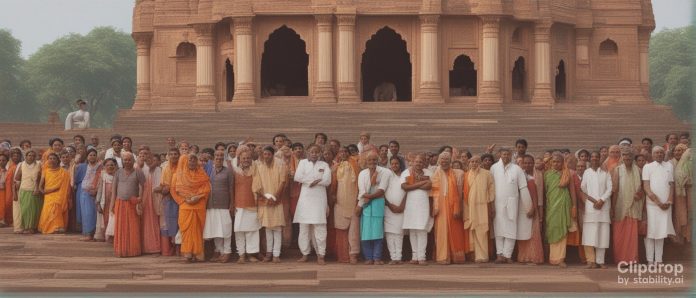Introduction
In the diverse tapestry of Indian society, two prominent factors have consistently shaped the contours of its political landscape: caste and religion. India’s rich history and social fabric have ingrained these elements deeply into its societal consciousness, inevitably influencing the realm of politics. The interplay between caste and religion in Indian politics is a multifaceted phenomenon that demands careful analysis to unravel its complexities.
Historical Context: The Roots of Caste and Religion in Politics
Caste and religion have been integral to India’s social structure for centuries. The caste system, with its origins in ancient texts and practices, classified individuals into distinct social groups based on their birth. Similarly, religion, with Hinduism being the majority faith, along with Islam, Christianity, Sikhism, Buddhism, and other faiths, has played a vital role in shaping the identity of Indians. These deep-seated cultural and social aspects laid the foundation for their eventual influence in politics.
Caste and Political Representation
One of the most prominent ways in which caste affects Indian politics is through the system of political representation. With the introduction of affirmative action policies such as reservations, marginalized castes have gained political access and representation. This has led to the emergence of caste-based parties, like the Bahujan Samaj Party (BSP) and the Rashtriya Janata Dal (RJD), that seek to address the concerns of specific caste groups. These parties often operate on the principle of social justice, aiming to uplift historically disadvantaged communities.
Religion and Identity Politics
Religion, too, has a significant impact on Indian politics, often manifesting in the form of identity politics. Religious identity can be a powerful tool to mobilize voters and gain political support. This phenomenon has led to the rise of parties that emphasize religious affiliations, such as the Bharatiya Janata Party (BJP), which promotes Hindu nationalism, and the All India Majlis-e-Ittehad-ul-Muslimeen (AIMIM), which primarily focuses on Muslim interests. While these parties claim to protect their respective religious communities, critics argue that such politics can also contribute to polarization and exclusion.
Vote Bank Politics: The Nexus of Caste and Religion
Caste and religion intersect in the realm of vote bank politics, where parties seek to consolidate support from specific communities based on their caste and religious affiliations. This strategy involves the distribution of benefits, promises of representation, and targeted policies to gain electoral advantage. This approach has its merits in terms of addressing historically marginalized groups, but it can also perpetuate divisions and limit broader policy considerations.
Challenges and Controversies
The role of caste and religion in Indian politics is not without its challenges and controversies. Critics argue that focusing on these factors hampers the country’s progress by diverting attention from pressing issues such as economic development, education, and healthcare. Moreover, allegations of vote bank appeasement and the manipulation of identities for political gain can undermine the democratic ideals of equality and inclusivity.
Moving Forward: Striking a Balance
As India strives to maintain its secular and democratic values while addressing historical inequalities, it faces the task of striking a delicate balance between catering to specific caste and religious interests and pursuing a broader agenda of societal progress. Promoting education, awareness, and inclusive policies that transcend caste and religious boundaries can pave the way for a more harmonious and equitable political landscape.
Conclusion
The intricate interplay between caste and religion in Indian politics reflects the complex mosaic of its society. While these factors have undeniably shaped the course of political discourse, the challenge lies in harnessing their potential for positive change without compromising the principles of democracy, equality, and national progress. As India continues its journey forward, understanding and addressing the complexities of these dynamics will be crucial for a more united and prosperous future.

